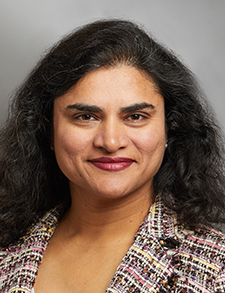
Dr. Dias
Presenters: Christine Lenzen, MD, and Tamara Maginot, PhD
Avoidant Restrictive Food Intake Disorder (ARFID) is an eating disturbance with persistent weight loss that can’t be explained by other etiologies including anorexia nervosa (AN). Compared to AN, patients with ARFID are generally younger, male, and suffering from the disorder for a longer duration. They also have higher rates of comorbid anxiety and other medical conditions. Interestingly, the rate of ARFID diagnosis in adults is increasing.
There are three subtypes, and these can overlap: selective restriction, fear of certain foods, and poor appetite. It’s not always easy to distinguish from AN and it can feel impossible to rule out every cause on the differential. However, after a targeted workup, treatment for ARFID, which overlaps with AN treatment, may be initiated with the potential to explore further diagnostic testing if the patient is not responding.
Behavioral management is a key component of the treatment. Sometimes structure is all patients need. Once patients begin eating what they will eat, you can initiate supplements. Supplements can be served in a way that is familiar like a medicine cup. Make it fun. Daily exposures with “potions” like Ensure Clear and called fun names like dragon juice can help. Tip: Give patients their preferred foods (chosen by a parent) to start.
If needed, nasogastric feeds are encouraged. After two days of refeeding, patients’ brains function better, allowing the patients to participate better in the program. The speakers recommended avoiding gastrostomy tubes, or G-tubes, as it’s hard to stop gastrostomy-tube feeds. The speakers also recommended avoiding total parenteral nutrition because patients should be encouraged to use their gastrointestinal tracts. The speakers recommended starting with the “least scary thing” first, which is often fluids.
The speakers recommended using simple rewards and consequences. Provide “free activities” (journaling, music) and “earned activities.” Partnering with parents is helpful as parents know what will motivate their children. Most children are motivated by electronics, walks, arts and crafts, and going outside, so these activities can be earned activities. In extreme cases, visits with parents may be earned activities. These behavioral plans should be included in the patient’s chart and tested with parents before “publishing.” Parents also are expected to be unified in front of kids.
Except in cases of abuse or dysfunction, parents play an important role. Communication is undertaken with parents early on to set expectations, including discharge criteria; while the long-term goal for most patients is to eat solids, the discharge goal may be to take nutrition orally. In the hospital, parents order the food the night before with help. They start to learn the principles they need for home.
For more challenging cases, mirtazapine may be used off-label. It helps patients drop their guard, promote their appetites, and decrease nausea and vomiting. Effects are seen within a few days of therapy initiation. It is started at the lowest dose of 7.5 mg. The medicine is generally used until the tail end of therapy (often this means for about one year) and then weaned off.
Discharging can be a challenge. For young children, residential and inpatient programs are not an option. However, outpatient programs are available. One year after discharge, 62% of ARFID patients are in remission, with only 21% requiring readmission.
Key Takeaways:
- Engage parents to be part of the treatment plan early.
- For the autistic population, having a schedule really helps. Children may play video games and won’t stop to eat. They do very well with rewards. Contingencies work well. For some patients, it may be five orange foods they will eat plus supplements.
- Try mirtazapine. Lorazepam sometimes is needed to start things off, but it should be avoided or used short-term as it’s hard to learn on lorazepam.
Dr. Dias is the chair of pediatrics at Bridgeport Hospital in Bridgeport, Conn., and the regional medical director for inpatient pediatric services at Yale New Haven Children’s Hospital in New Haven, Conn.